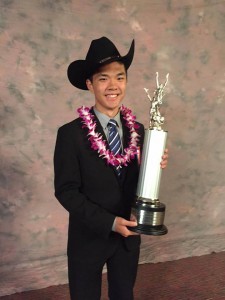[fblike]
 Brian Yu competed for Monte Vista High School in Danville, California. He was the 2015 NSDA U.S. Extemp National Champion, a three-time California state champion in U.S. Extemp, the winner of the 2014 California Invitational, and a two-time NSDA U.S. Extemp finalist. Brian will be attending Harvard University in the fall, where he will study computer science and economics.
Brian Yu competed for Monte Vista High School in Danville, California. He was the 2015 NSDA U.S. Extemp National Champion, a three-time California state champion in U.S. Extemp, the winner of the 2014 California Invitational, and a two-time NSDA U.S. Extemp finalist. Brian will be attending Harvard University in the fall, where he will study computer science and economics.
Brian agreed to talk with Extemp Central about his career and share his thoughts on the activity.
Thanks for agreeing to this interview with us Brian.
Thank you for having me!
You began your career, at least at NSDA Nationals, in Lincoln-Douglas debate. What made you decide to switch to extemporaneous speaking?
When I first joined speech and debate, Lincoln-Douglas debate was the event I had the most familiarity with and interest in. I was fortunate enough to qualify to NSDA (then NFL) nationals my freshman and sophomore years in LD, but never broke. I only started competing extemp during my sophomore year, and I decided to pursue it at NSDA Nationals starting my junior year after encouragement from my coach and after realizing the potential I had in the event.
Did you find that your experience in debate was an asset to you when you did extemp?
Definitely. The other events that I competed in aside from extemp really helped to enhance my extemp ability. Debate experience was incredibly valuable in helping me learn to construct and present persuasive arguments. Aside from debate, I spent my freshman year competing in Original Oratory– which did wonders for my abilities as a speaker. Oratory teaches a precision of language and nuanced delivery techniques that I think a lot of extempers could benefit from, and I attribute a lot of my success in extemp (especially early on) to the strategies I learned in oratory.
What was your biggest struggle when you initially began extemporaneous speaking? How did you overcome it?
For me, my biggest initial obstacle was my lack of knowledge about the country and the world. When I started extemp, I was reasonably good at logical argumentation, memorizing, and speaking– but the area where I lacked most was just understanding current events and public policy. That made early speeches especially challenging, since often I would draw three fairly basic questions and have absolutely no idea how to answer any of them.
The only way to really deal with that issue was to get informed. My parents were really supportive and signed me up for a subscription to the Economist, I started to read newspapers daily, and I gave practice speeches on unfamiliar topics as often as possible. It’s not the sort of thing where one day I was finally able to overcome it– becoming informed about the world is a gradual process, and becoming comfortable discussing the nation’s issues took time and consistent effort.
In your opinion, what are the qualities that a great extemporaneous speaker possesses?
Beyond the obvious quality of being able to answer questions in a logical, knowledgeable and articulate way, I think the best extemp speakers have the ability to teach audiences about an issue and convey the significance of that issue. More importantly, they do so in a way that’s both very informative but also easy to understand. I’ve spoken to parents on my team who volunteer to judge extemp at tournaments, and I consistently hear them say that a speaker “was a great speaker, but I didn’t understand what they were talking about.”
A great extemporaneous speaker should make sure that the audience understands the issues being discussed. That means embracing simplicity, but not “dumbing down” or oversimplifying the topic: it means conveying complexity and nuance in a way that’s easily understood. That’s not easy to do, but when done well, it leads to an extemp speech that leaves audiences thinking “Wow. I understand that topic a whole lot better now.”
You won three consecutive California state championships in U.S. Extemp in your career. What do you think helped to achieve this unprecedented level of success, especially in such a difficult “extemp” state?
Great coaching, really supportive and helpful teammates, and a lot of practice were the biggest factors that contributed to my success. At the tournament itself, I made a conscious effort to make every speech interesting. All of the competitors at the state tournament are knowledgeable and fluent speakers. But what I think separates competitors out the most at that level is the difference between speakers who just give an answer to a question supported by facts, and those who deliver an interesting and engaging speech that discusses the issue. Interesting speeches are the ones that end up being memorable to the judge.
How would you characterize the California circuit? Since California will host the 2016 NCFL National Tournament, do you have any advice for competitors heading to Sacramento to appeal to the local judges that will be there?
The California circuit is in many ways isolated from the rest of the national circuit: most big invitational tournaments in California are almost entirely filled with California extempers, and California doesn’t have a great showing in many national circuit tournaments. There are a lot of really talented California extempers, but they aren’t as well known because of that isolation.
In terms of advice, I’d say that the judges in California as a general rule are looking for speakers who not only answer the question effectively, but also really hold the judge’s interest. It’s not enough just to give a good answer, you need to make the judge really care about the impact of the answer. That’s probably true everywhere in the country, but I’ve seen it especially so in California.
What was your practice routine like prior to the NSDA National Tournament? Did you have a specific way of attacking all of the possible topic areas?
I tried to give a speech every day at home, and I spoke three times a week in front of my coach and my teammates. The feedback from my coach and teammates was the most valuable tool I had: every “That didn’t make sense to me.” or “I wasn’t convinced by that.” was an indication of somewhere that I could improve. I also tried to brainstorm every issue I could conceivably imagine coming up at the tournament and spend time thinking about each, which worked well: I had previously thought about analysis for every question I drew at NSDA nationals except for one semifinal question about unicameral legislatures.
Do you think your experience in the 2014 NSDA final round helped you when you made it back to the final round this year?
Absolutely. The final round stage is an intimidating place, and in 2014 that nervousness hurt my performance. Knowing that I had already been through the process once gave me some confidence that I would be able to do it again. Still intimidating, though.
Walk us through your experience at the NSDA National Tournament, including your preparation for the final round.
For the first three days of competition, it was nonstop focus. After every speech, I would go back to the prep room, read through files on the next topic area, and focus on delivering an engaging speech each round. I also had two younger extemp teammates with me competing for the first time at NSDA Nationals, so I tried to give them as much advice as I could.
Thursday is the day of anticipation before Friday’s final round. I had most of the day to just think and prepare, and I spent most of the day filing articles and making sure I was up to date on the latest news. Then during the final round itself, when I drew the question on Obamacare, I knew I could answer it well, so I focused on conveying my message persuasively and enjoying my final speech.
When you concluded the final round, did you think you had won the national championship?
To be honest, I had no idea. As the last speaker, I hadn’t heard most of the speeches. I knew that I had given a good speech, but everyone at that level is good, so I didn’t really have a basis for comparison. After hearing about the round from people who watched it, I thought I might have a chance, but I was definitely never totally confident.
Is there any general advice that you would give to aspiring extemporaneous speakers, especially those who have just started their careers?
Practice to everyone. Your coach is of course a great resource, and will help you develop your ability, but don’t limit yourself to just practicing to him or her. Practice to teammates who do other events, practice to friends who have never heard of speech and debate, practice to parents. Each one of them will have very different thoughts and impressions on your speeches and how they could be better.
Speech is about communicating with your audience, and every audience is different. Practicing with different audiences and learning to convey your message no matter who the audience is will dramatically improve your speaking.
Did you have a favorite tournament in your career on the local or national level? If so, what was it and why?
My first Glenbrooks (during my junior year) is probably the tournament that stands out as one of the most fun, memorable, and enlightening of my career. It was really the first opportunity I had to compete against non-California extempers, and though I didn’t do as well as I would have liked (I was eliminated after a quarterfinal panel that featured myself, Lily Nellans, Miles Saffran, and Brian Anderson all speaking consecutively), I watched the semifinal and final rounds and learned a lot about analysis and speaking style that I was able to use to improve my own speaking.
If you could fix one aspect of extemporaneous speaking, what would it be?
I’ve always thought that the whole “draw three topics, pick one, return the other two” is really unfair to late speakers, since they’re not really drawing three random topics anymore– they’re drawing three topics from the pool of topics that none of the other speakers wanted. This is especially problematic when there aren’t very many questions to choose from to begin with.
A solution that I’ve seen, which I’d like to see become the norm, is to cut question sheets (with questions in random order) into slips that each contain three questions. Each contestant then draws one slip of three questions, and picks a topic from there. Every speaker still gets three random questions, but now they’re truly random.
What are your future academic and career plans?
I’m attending Harvard University in the fall and planning to study computer science and economics, and think I might pursue something in software design in the future. Honestly, though, I have a tendency to make plans and then change the plans, so that might end up being totally different from what I end up doing.
Thanks for agreeing to speak with us Brian and congratulations on winning last year’s NSDA U.S. Extemp national championship.
Thank you again!
